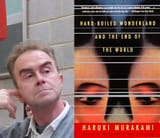Anonymous
7/18/2025, 7:30:53 PM No.24561505
Give some examples.
Haruki Murakami's Hard-Boiled Wonderland and the End of the World features chapters that alternate between two seemingly unrelated narratives. When translating the novel, Alfred Birnbaum made the decision to have the odd chapters that take place in Tokyo be in past tense, and the even chapters that take place in The Town in present. This does more than just add to the atmosphere. When considering things like psychic distance, it could be said that present tense is a closer perspective than past; less psychic distance. After finishing the story, this almost seems like a slight translator's hint as to what's going on in the story.
Haruki Murakami's Hard-Boiled Wonderland and the End of the World features chapters that alternate between two seemingly unrelated narratives. When translating the novel, Alfred Birnbaum made the decision to have the odd chapters that take place in Tokyo be in past tense, and the even chapters that take place in The Town in present. This does more than just add to the atmosphere. When considering things like psychic distance, it could be said that present tense is a closer perspective than past; less psychic distance. After finishing the story, this almost seems like a slight translator's hint as to what's going on in the story.
Replies:
